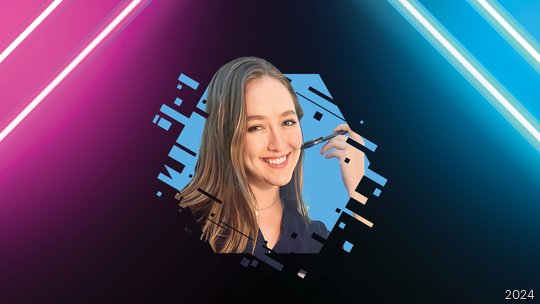
DANI WILDER
Inventor, Narcan Carry Case | 25
Washington University student Dani Wilder’s invention, the Narcan Carry Case, is a silicone keychain attachment that encapsulates naloxone nasal spray (used to counteract opioid overdose) in durable, discreet and convenient-to-carry packaging.
In July, one of its beta testers used it to save a life. “No achievement for Dani has ever compared to the feeling of her entrepreneurial efforts resulting in a life being saved,” her nominator, Cyril Loum, assistant director of venture development at the Washington University Skandalaris Center, wrote. “Every minute spent on this venture is aimed towards saving as many lives as possible and, seeing that dream start to come to life, nothing could be more rewarding.”,
Beyond her work with nCase Technologies, Wilder, 25, organizes annual flu shot clinics and founded the WashU Student Tutoring Initiative during the pandemic. She founded the Artificial Intelligence in Medicine club. “She created an interdisciplinary culture of curiosity, experimentation, and diverse dialogue. Her work here emphasized her commitment to developing health care professionals who are not only tech-savvy but also ethically informed,” Loum wrote.
Why do you have this interest? The opioid epidemic has touched nearly every corner of America, and I’ve come to realize that almost everyone has a story about how it has impacted their lives — whether it’s someone they know struggling with addiction or the heartbreak of losing a loved one. For me, it’s the latter. I lost a close friend from high school to an opioid overdose when he was just 20 years old. The grief was overwhelming, and the helplessness was suffocating. I couldn’t stop wondering what more I could have done to save him. He owned Narcan, but he didn’t carry it with him when it mattered most. That reality haunts me and has profoundly impacted my life.
This loss motivated me to create nCase Technologies. I am committed to ensuring that Narcan is not just owned but carried, readily accessible and integrated into daily life for those at risk and their loved ones. By making Narcan easier to carry, I hope to prevent others from experiencing the same heartbreak I did. My goal is to give people a fighting chance to survive an overdose, with the hope that they can eventually find their way to recovery. This mission drives everything we do at nCase Technologies, and it’s deeply personal to me.
What do you know about the life your Narcan Carrying Case saved, and how it was used? While I can’t share specific details about any lives our product may have saved, I can share the deeply personal story that inspired its creation. One night, a group of medical students, including a close friend of mine, encountered someone experiencing an overdose in Tower Grove. Despite owning Narcan, my friend didn’t have it with her at that critical moment. Tragically, they could only watch as the person’s life slipped away while waiting for emergency services to arrive.
Determined not to be caught off guard again, my friend tried to make Narcan more portable by hole-punching the blister pack to attach it to her keychain. Unfortunately, this quick fix wasn’t durable, and it broke soon after. This incident sparked the idea for the Narcan Carrying Case, a product designed to ensure that Narcan is always within reach, easy to carry, and durable enough to withstand daily life. Our mission is to make sure that no one else has to experience the helplessness that was felt that night, and to provide a reliable solution that could save lives.
Can you tell us about the design process for carrying cases? The design of our Narcan Carry Case was driven by a critical need to overcome the barriers that prevent people from carrying Narcan daily. We discovered that despite its life-saving potential, 85% of Narcan owners don’t carry it regularly. The existing packaging was too bulky, easily damaged, and often stigmatized — making it impractical for everyday use.
We set out to change that with a design that is small, durable, and keychain-compatible. Made from smooth, soft urethane cast silicone, the case has a high-end feel with a comfortable grip. Its modern, geometric shape features rounded, clean edges and flat surfaces, giving it a minimalist appearance. The case is discreet, with a singular, neutral color — currently in our signature purple, but flexible for other options — that enhances its appeal as an accessory. The practicality of our design lies in its compact size, fitting easily in the palm of your hand and offering multiple ways to carry it: in any pocket, on a backpack, keys, belt loop, lanyard or purse.
By focusing on design, we’re not just making Narcan easy to carry — we’re making it something people genuinely want to carry. We’re shifting the narrative, turning Narcan from a hidden necessity into a stylish, everyday accessory. Our goal is to make carrying Narcan as natural as carrying a set of keys, empowering more people to be prepared and, ultimately, saving lives.
What are your career goals, and how does your work with the Narcan Carrying Case and the Artificial Intelligence in Medicine club reflect them? As a third-year medical student with a strong interest in emergency medicine, I am driven by a passion for innovation in health care. My faculty mentor once described me as a “serial academic entrepreneur,” a description that resonates with how I approach my career. I thrive on identifying and pursuing opportunities where I can merge clinical practice, technology and research to tackle complex challenges and advance patient care.
My work with the Narcan Carrying Case is a testament to this entrepreneurial mindset. It reflects my dedication to finding practical, real-world solutions that address pressing public health needs. By developing a product that integrates seamlessly into everyday life, I aim to make life-saving medication more accessible, ultimately reshaping how we approach the fight against the opioid epidemic.
In parallel, my involvement with the Artificial Intelligence in Medicine Club underscores my commitment to exploring the future of health care. AI offers unprecedented potential to transform diagnostics, treatment and disease management, and I am eager to contribute to this evolving field. My career goal is to be at the intersection of medicine, technology and business, where I can continue to innovate and lead meaningful change in health care.
Click on the links below to read profiles of this year's Inno Under 25 honorees:












